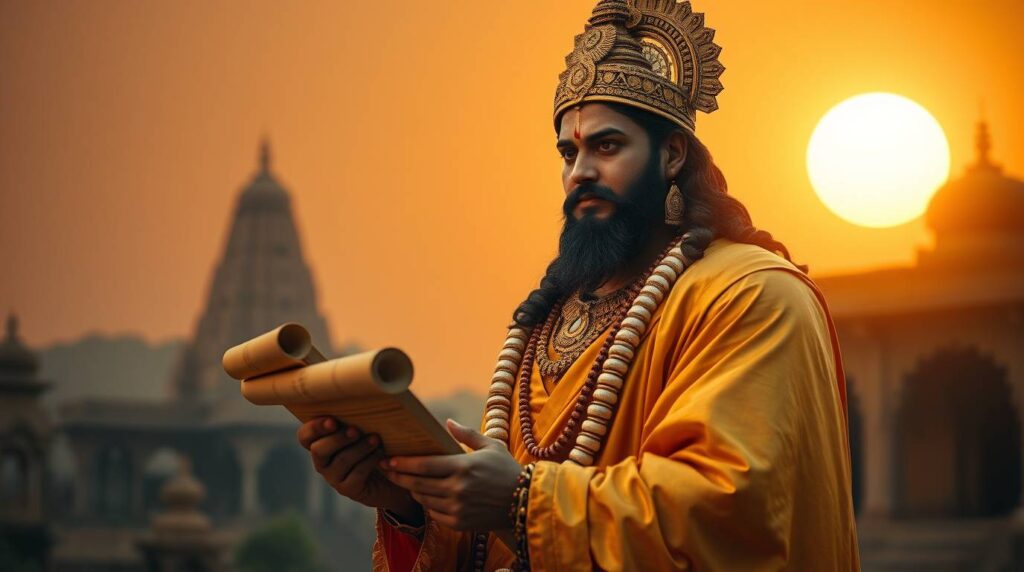
Uttara Phalguni, known as the “Star of Patronage,” is imbued with themes of royalty, generosity, and responsibility. The deity presiding over Uttara Phalguni is Aryaman, one of the 12 solar Adityas, revered as the god of leadership, honor, kindness, and contracts. This gives a big clue to the nakshatra’s past-life scenarios. Many Uttara Phalguni souls likely incarnated as people of high status or authority – think of a benevolent king or queen, a tribal chieftain, or a wealthy landowner known for philanthropy. In those lives, they dealt with contracts and unions of all kinds: marriage alliances, treaties of peace, and large familial or societal responsibilities. If they upheld honor and protected their people (as Aryaman would), they accrued positive karma, perhaps seen now as inherited blessings or strong social support. However, if they fell prey to arrogance or neglected their duties, debts were formed.

One common past-life imprint for Uttara Phalguni is the burden of leadership. Being in charge might have led to tough choices – maybe they had to sacrifice personal happiness for duty, or they enjoyed privilege while their subjects suffered. A soul who once misused resources or oppressed others in power would carry a karmic debt of service now. Conversely, a soul that was noble yet unappreciated might return with an unconscious expectation of reward. Family karma is also significant: Uttara Phalguni spans the cusp of Leo and Virgo, connecting regal pride with practical service. It is possible these natives had experiences as the head of a lineage or as a key figure in preserving family wealth (or losing it). Unresolved issues around inheritance, legacy, and ancestral honor could be part of their baggage. For instance, perhaps they were entrusted with a great family estate or tradition and things went awry – those unresolved responsibilities become part of their current life narrative.
The shakti of Uttara Phalguni is Chayani Shakti, the power of accumulating prosperity through partnerships (marriage or contracts). If in past lives they formed alliances that were unfair or broke oaths (like betraying an ally or spouse), that spiritual contract remains active, seeking resolution now. Imagine a scenario: an ancient ruler promises protection to a neighboring kingdom via marriage but later abandons that pact – such an act would generate karmic repercussions. Thus, Uttara Phalguni often carries a debt tied to keeping one’s word and sharing bounty. In summary, the unresolved karmas of this nakshatra center on how one handled power, promises, and patronage. Did they act with Aryaman’s nobility, or did ego and negligence creep in? The current life will be set up to address these very questions, ensuring the soul learns to reclaim the highest virtues of loyalty, generosity, and responsible leadership.
Karmic Themes & Soul Contracts in This Lifetime
In the present life, Uttara Phalguni natives find themselves repeatedly confronted with themes of duty, alliance, and resource management. A prominent karmic theme is partnership as a path. Many will enter significant marriages, business partnerships, or mentor-mentee relationships that feel “fated.” These aren’t just casual bonds; they carry a weight of destiny. This stems from their soul’s commitment to work through issues of union. The contract might be: “In this life, you will learn to honor agreements and flourish through cooperation.” As a result, breaking a promise or treating a partner unfairly tends to backfire swiftly for Uttara Phalguni – their karma is wired to push them toward equity and loyalty.
Another theme is stewardship of wealth or talents. These individuals often either inherit something substantial (money, property, a family business, or even a legacy of knowledge) or find themselves in positions where they must build a secure foundation from scratch. In both cases, the underlying test is how they manage prosperity and responsibility. They might notice they have a knack for attracting opportunities for success – “prosperity through contracts and marriages” is literally associated with this star. This is their past good karma offering support. Yet, the soul contract requires them to use that support wisely. If they become lazy or self-indulgent, life will give a jolt – for instance, a financial setback or a conflict that forces them to step up and be accountable. It’s as if their soul agreed that comfort would come with conditions, namely the expectation to share and support. Indeed, Uttara Phalguni’s energy strongly inclines toward charity, healing, and helping others. So, we often see these natives taking on roles like community organizers, patrons of arts, or simply the friend who always helps others solve problems. That’s their patronage theme in action.
Family and ancestors also play into their karmic themes. They might feel a strong tie to their lineage – sometimes manifesting as traditional values or the need to “live up to the family name.” This can be a soul agreement to heal or continue ancestral karma. For example, if there was a pattern of broken marriages in the family line, an Uttara Phalguni might contract to break that cycle by forging a lasting, healthy union (Aryaman is also called the king of ancestors and protector of inheritance, hinting that these folks often deal with ancestral blessings or burdens). There’s often an implicit promise to ancestors: “I will carry forward the torch honorably.” Thus, such natives may experience uncanny support from elder figures or sudden windfalls as if their forebears are aiding them – and equally, they may sense a heavy conscience if they ever stray from integrity, as though the ancestors disapprove. All these themes – partnerships, prosperity, duty, and ancestry – are woven into Uttara Phalguni lives as the playing field where their karmic lessons unfold. The contracts are clear: lead with generosity, honor all commitments, and use your throne (whatever form it takes) for the good of all.
Spiritual Lessons and Evolutionary Purpose
The spiritual curriculum of Uttara Phalguni is about learning true generosity and the proper use of power. One key lesson is encapsulated in Aryaman’s qualities: honor and kindness. The soul is learning that leadership is service, not privilege. In practice, this means evolving from any residual arrogance (that might linger from a past life of royalty) into a stance of humble responsibility. The universe often teaches this by putting them in charge of something and then making them depend on others for success – a reminder that we rise by lifting others. For instance, they might head a project at work but need the whole team’s cooperation to shine, or they might be the eldest sibling tasked with caring for younger ones, learning patience and selflessness in the process. Each scenario nudges them toward nobility of character: doing what is right even if it’s not easy, and seeing others’ welfare as intertwined with their own.

Another spiritual lesson for Uttara Phalguni is balance between enjoyment and duty. This nakshatra carries the energy of both luxury and discipline. The Leo part gives love of comfort and celebration, while the Virgo part imparts work ethic and pragmatism. The soul must learn to integrate these – to neither renounce joy nor shirk duty. An evolved Uttara Phalguni realizes that proper enjoyment comes after fulfilling duties, and also that duty itself can be a joy when done with love. Their evolutionary aim is to master Seva (selfless service) while also embracing the richness of life. In other words, they are meant to be the generous king who hosts a feast for all – partaking in the pleasures, but ensuring everyone is fed. The power to accumulate through partnership implies their greatest successes will come when they uplift those they are partnered with (spouse, colleagues, etc.), a direct antidote to any selfish impulses.
Importantly, Uttara Phalguni has a lesson in forgiveness and gratitude. Being the “later Phalguni,” it often deals with the aftermath of what Purva Phalguni (the earlier star of love and fun) began. This can manifest as cleaning up messes or persevering through the less glamorous parts of relationships and projects. Spiritually, this teaches endurance and the ability to keep the heart open over the long term. The evolutionary purpose here is to cultivate a kind of steady sun-like warmth (their ruling planet is the Sun) that does not waver when the initial excitement fades. By forgiving the shortcomings of others and themselves, and by remaining grateful for the connections and resources they have, they generate sustained positive karma. In fact, Uttara Phalguni is said to bring “prosperity that results through union”, which on a higher level means spiritual prosperity (growth) through the union of souls – learning that we’re all in this together.
Ultimately, the Uttara Phalguni soul is working toward the ideal of the Dharmic leader or Patron Saint. Their highest purpose is to become someone who naturally and joyfully provides for others, be it material support, guidance, or protection. This fulfills Aryaman’s influence as the protector of inheritances and contracts of friendship – they become protectors and benefactors in their sphere. Spiritually, this is a role of great merit. By practicing charity and righteousness, they significantly increase their dharmic bank account. Ancient Vedic wisdom hints that under Pushya, good karma and efforts are amplified; likewise, under Uttara Phalguni’s influence, acts of philanthropy and keeping one’s word are especially powerful. The evolutionary result is that these natives often later in life attain a sense of inner royalty: a confidence that comes not from ego, but from knowing they have consistently tried to do right by others. This self-respect is the fruition of their lesson in honor. In sum, the spiritual mandate “to whom much is given, much is expected” is core to Uttara Phalguni. By living up to that, they fulfill their karmic journey – evolving from possibly entitled beginnings into a soul whose noble heart and generous deeds are its true crown and throne.
Personality Patterns Shaped by Karma
Uttara Phalguni individuals often present a regal yet friendly demeanor, a direct inheritance from their karmic past. They typically exude confidence without coming off as unapproachable. People may describe them as warm, generous, and reliable. They carry themselves with an air of dignity – straight posture, steady gaze – and often have a commanding presence in groups. This “natural leadership vibe” is the echo of former lifetimes where they held positions of respect. They can be quite independent and proud, valuing their self-sufficiency (Sun’s influence). At the same time, they usually have a sociable, amicable side; they like people and people usually like them. This balance makes them approachable authority figures – the kind of boss or elder sibling who is protective and yet fun-loving.
The karmic imprint of responsibility makes them conscientious. Even from youth, many Uttara Phalguni kids act a bit older than their age, instinctively taking charge of situations or looking after others. As adults, they are the ones who remember birthdays, organize help for a friend in need, or mediate family disputes. There is a strong streak of helpfulness and philanthropy. They might enjoy hosting gatherings, seeing that everyone is comfortable – a throwback to the patronage role. In their careers, they often gravitate to roles where they can mentor or manage, or anywhere they feel their work has tangible benefits for others. A well-aspected Uttara Phalguni personality shines with nobility: gracious in manner, fair in decision, and blessed with what seems like good karma (they often experience lucky breaks or support at crucial moments, reflecting their accrued merit).
However, the shadow side of their personality shows the karmic wrinkles they’re here to iron out. One pattern can be ego and bossiness. They might at times assume they know what’s best for everyone, becoming a bit paternalistic or domineering, especially if stress triggers their pride. The RAhasya tradition lists traits like egotistical, bossy, critical, and arrogant as potential weaknesses for this nakshatra. These flaws stem from that old kingly ego that can resurface under pressure – a subconscious memory of “I’m in charge.” They may have to work on not being overly critical or expecting others to live up to their high standards. If unevolved, an Uttara Phalguni might also lean into entitlement, assuming they deserve special treatment or luxury without putting in equal effort (especially if in past lives they were served by others). Life tends to knock them down a peg when this happens, perhaps through humbling experiences where they must ask for help or face failure.
Another karmic pattern is difficulty with change. As a fixed star partly in Leo, they can be quite stubborn or set in their ways. Once they’ve established something – a routine, a belief, a relationship – they will endure a lot to maintain it. This loyalty is admirable but can also trap them in stagnant situations, all because they feel duty-bound or fear the dishonor of quitting. This is that “staying at the helm even as the ship sinks” tendency, reflecting their contract to honor commitments – sometimes to a fault. Emotionally, they may hide insecurities behind a facade of being always “okay” or happy. The RAhasyavedic notes mention “puts on a happy smile to cover up anger or sadness”. This indicates a reluctance to show vulnerability – perhaps a karmic hangover of having to appear strong for one’s subjects or family. They’ll often shoulder burdens silently and can feel secretly lonely at the top.
Despite these challenges, the general personality of Uttara Phalguni natives is that of a benevolent leader or steadfast friend. They usually learn and mature quickly from their missteps, because their inherent goodness steers them back on course. People around them often sense that they’re dependable, the kind you can count on in a pinch. This reliability and big-heartedness win them admiration and love, which in turn reinforces their better qualities. Over time, as they consciously soften their pride and open up emotionally, they truly embody the nickname “the noble patron” – someone with a big heart, broad shoulders to carry responsibilities, and an open hand to give to others.
Path to Evolve: Resolving Uttara Phalguni Karma
To navigate and resolve their karma, Uttara Phalguni natives should focus on service, humility, and wise leadership. One practical step is to consciously use their resources for good. If life has given them wealth or influence, they ought to share it – donate to causes, support a friend’s endeavor, finance a family member’s education, etc. These acts directly align with their soul’s intention of patronage. Even on a smaller scale, being generous with time and skills – like offering pro bono work or organizing community events – helps fulfill their karmic duty. Each such act balances any past misuse of privilege and strengthens the flow of positive karma (their star literally gains strength through such union and sharing).
Cultivating gratitude and reverence is another key. Making it a habit to silently thank their ancestors, mentors, or even employees instills humility. Some might engage in ancestral healing rituals or simply light a candle in remembrance of forebears, acknowledging that they stand on others’ shoulders. This reverence for the past and for those who support them now keeps their ego grounded. Likewise, regularly reflecting on the contributions of their partners (spouse, coworkers) and expressing appreciation will enhance harmony in their partnerships – thereby upholding their karmic contract to honor unions.
Learning to delegate and collaborate is crucial for these self-reliant souls. They should remind themselves that being a leader doesn’t mean doing everything alone. By empowering others and trusting their team or family members with responsibilities, they break any subconscious pattern of domineering or hoarding control. This team-centered approach satisfies Aryaman’s aspect as the god of society and contracts – essentially, it’s about sharing power. In a karmic sense, every time they choose consultation over dictation, they dissolve a bit of the old autocratic residue. If they find themselves being overly critical or bossy, a good practice is to step back and listen – actively seek input from those who might be affected by their decisions. Over time, this builds a habit of just and inclusive leadership.
On a personal growth level, addressing stubbornness and stress is important. Uttara Phalguni natives would benefit from mindfulness techniques that help them let go of control. Yoga or pranayama (breathwork) can be excellent, as they release tension from the body and increase flexibility – symbolically helping them become more flexible in life. Since this nakshatra’s goal is Moksha for its partner (Purva Phalguni) and Artha (prosperity) for itself, blending spiritual practice with worldly duties is ideal. They might set aside time for meditation or visiting a temple regularly, which reinforces humility by bowing to something higher (the Sun deity or Aryaman, for example). Also, performing seva (volunteer work) in a spiritual community could be doubly beneficial, fulfilling both service and spiritual growth.
In relationships, practicing equality and tenderness resolves a lot of karma. If married, treating the spouse as an equal partner – and genuinely listening to their needs – may sound obvious, but for someone with latent kingly habits, it can require mindfulness. They should remember that the marriage or partnership itself is a sacred entity that brings fortune when respected. Simple things like jointly making decisions, apologizing when wrong, and prioritizing the partner’s happiness ensure that the marriage contract remains a source of prosperity rather than karma. Should conflicts arise, using the energy of forgiveness (another Aryaman trait) rather than pride will heal and not harm their karmic path.
Finally, embracing the role of a mentor or protector for those who lack support is a beautiful way to resolve karma. Whether they formally take someone under their wing or informally become the “rock” for a friend group, by living as a true patron – generous, patient, guiding – they redeem any past mistakes of negligence. It’s as if they’re making amends by paying forward kindness. And life tends to reward them quickly; many find that the more they give, the more the universe gives back (be it in success, love, or inner peace). In doing all this, Uttara Phalguni natives gradually find that their initial challenges with ego or burden lighten. They start to feel a profound sense of belonging and purpose – surrounded by people who love them for who they are, not just for what they have. That community of goodwill is actually the fruits of their resolved karma. Ultimately, they step fully into their dharma as the noble-hearted leader, fulfilling Aryaman’s legacy on earth: one who upholds honor, spreads prosperity through unity, and leads with a compassionate soul. This is the state of karmic resolution that allows their soul to evolve to the next level, carrying forward only the merits of kindness and leaving behind the weights of past power struggles.
